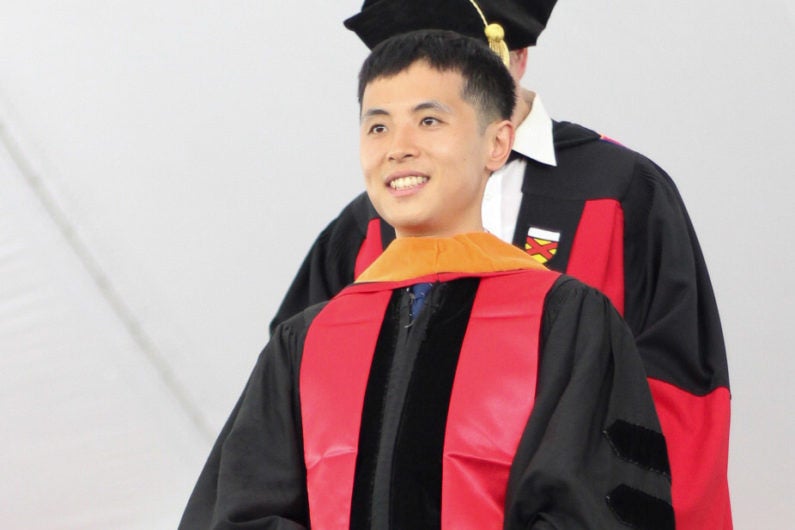Stanford’s treasure trove of electronic theses and dissertations tops 5,000 mark
Most Stanford students submit theses and dissertations electronically under a free program established by Stanford University Libraries and the Office of the University Registrar.
When Yusi Chen decided to submit his dissertation electronically, he helped Stanford achieve a milestone by becoming the 5,000th student to upload his treatise through the university’s innovative Electronic Thesis and Dissertation service.

Yusi Chen became the 5000th Stanford student to submit his dissertation electronically after earning his doctorate in electrical engineering in January. (Image credit: Courtesy Yusi Chen)
“I’m so glad that I’m the lucky one,” said Chen, responding to the news from Shanghai, where he is working as a management consultant for McKinsey & Co. Chen, who earned a doctorate in electrical engineering at Stanford in January 2017, is the author of the dissertation, Thin-Film Crystalline Solar Cells for Low Capex Manufacturing.
Chen said he chose an electronic dissertation over a paper version because it would be much easier for people to access his work online.
“Throughout my studies at Stanford, I realized the importance of knowledge sharing for technology innovations,” he said.
Chen said the submission process was also convenient and easy to use, and staff members at the Student Services Center were very helpful.
“Last, but not least, with an electronic dissertation I could avoid the use of paper and help us save some trees,” he said. “As a student at Stanford, I was devoted to helping stop climate change by researching renewable energy. Therefore, I definitely wanted to contribute a little more to our environment by submitting an electronic dissertation.”
Since Chen submitted his dissertation electronically late last year, more than five dozen other Stanford students have followed suit. Each year, Stanford adds about 700 electronic theses and dissertations to its online collection. Nearly 100 percent of doctoral students take part in the optional program, which is free.
The program, which Stanford launched in late 2009, is a partnership of Stanford University Libraries and the Office of the University Registrar. Teams from both organizations developed the program, including supporting policies, workflows and software to enable the submission, processing, online availability and preservation of Stanford theses and dissertations in digital form.
Tom Cramer, assistant university librarian at Stanford, said handling dissertations and theses digitally is faster and cheaper than handling a paper version. With digital submission, students no longer have to print and collate multiple copies, so they save several hundred dollars in printing and binding costs.
“Submitting digital theses and dissertations is also better because they are accessible on the web, are discoverable via Google and other search engines, and maximize the visibility and impact of student research,” Cramer said. “Stanford theses and dissertations are one of the most often searched resources in Stanford University Libraries. With a digital approach, they become an instant part of the global scholarly record.”
Cramer said the program is an example of how the library is keeping pace with services and information in the Information Age. “As the materials and methods of research, teaching and learning increasingly shift to the digital, we are keeping pace and applying technology to improve service while maintaining the library’s traditional mission of managing information for Stanford past, present and future,” he said.
Stanford catalogs electronic theses and dissertations in its online library catalog and archives the files in the Stanford Digital Repository. The university’s digital library service ensures that the work is always accessible to users, regardless of inevitable technology changes over time.
University Registrar Tom Black said Stanford takes digital innovation one step further by linking the doctoral student’s dissertation to the electronic version of the official transcript. Electronic transcripts are certified PDFs that link to the preservation copy of the dissertation in the Stanford Digital Repository.
“We are proud to offer our doctoral graduates the most complete, comprehensive official record in the country,” Black said.
